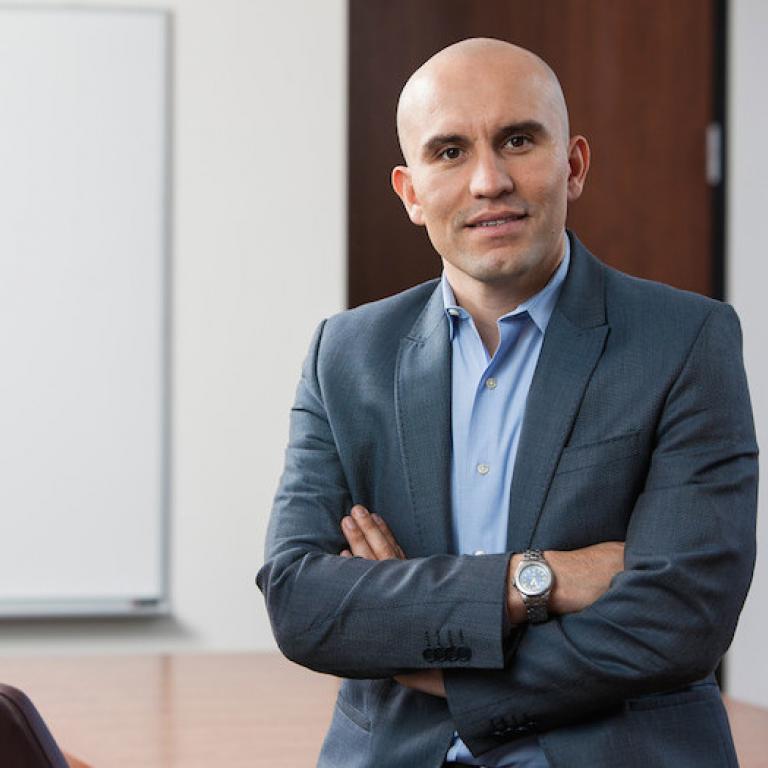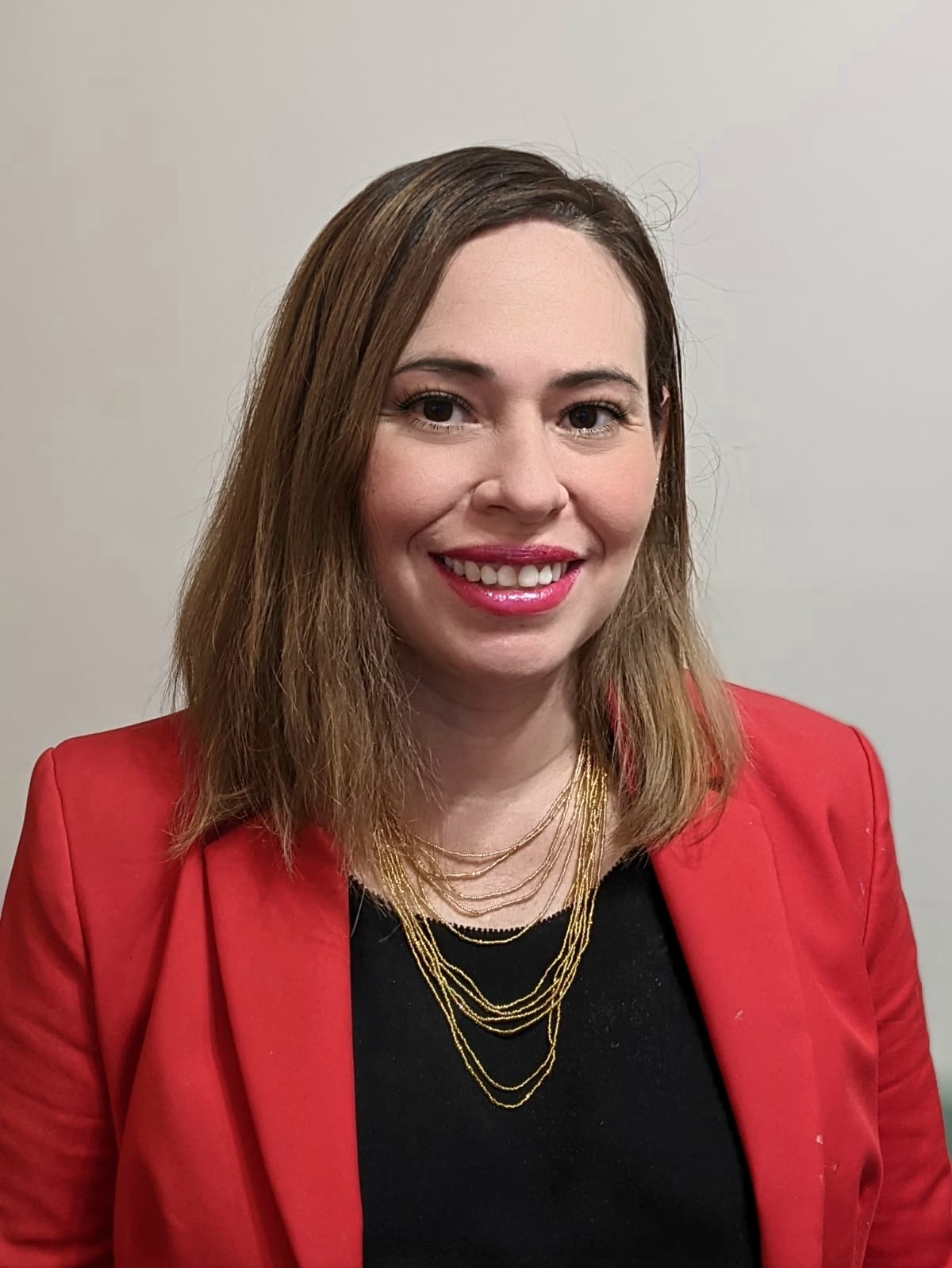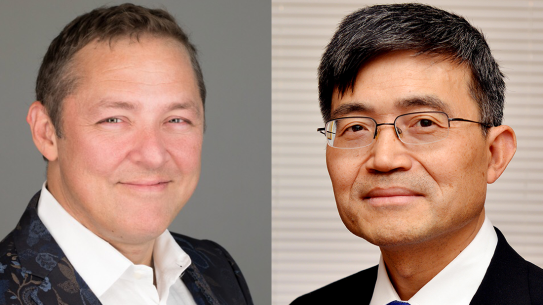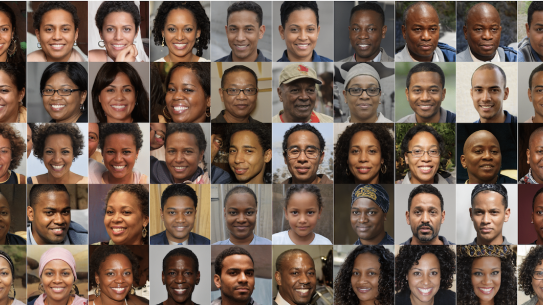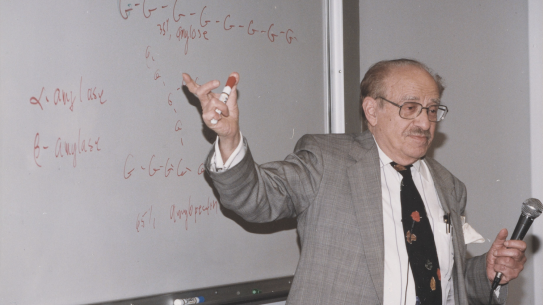Graduates sin límites
NYU Tandon honors our Latinx alumni
There’s a vibrant community of Latinx Ph.D. candidates and graduates at NYU Tandon.
- Daniela Blanco
- JeanCarlo (JC) Bonilla
- Ivan Guzman
- Bertha Jimenez
- Rich Perez
- Juan Rodriguez
- Santiago Torres Arias
Daniela Blanco (‘20)
Chemical Engineering
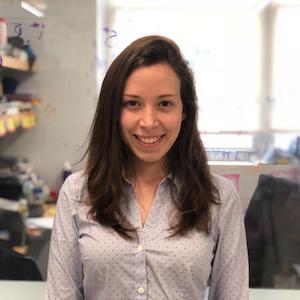
Why did you decide on NYU Tandon?
I earned my B.S. in chemical engineering in Venezuela, but I had been dreaming for a long time about studying in New York City. NYU turned out to be everything I wanted it to be. The professors, facilities, and resources were there to support my goals and open my mind to even greater possibilities.
You founded a successful company while still a student; how did that come about?
In 2017, my professor and mentor Miguel Modestino was researching a method of using water, plant waste, and solar energy to manufacture nylon, instead of the fossil fuel generally used. Myriam Sbeiti, a bachelor’s degree student who graduated in 2018, and I joined forces with him to take that innovation from the lab to the real world, and that’s how our company, Sunthetics, was born. We were concerned that the fashion industry produces millions of tons of petrochemical-based nylon each year, generating significant emissions of carbon dioxide, and we saw this as a way to help.
Our mission has since broadened. Overall, the chemical industry commands roughly one quarter of the world’s energy demand, mostly in the form of fossil fuel-generated heat needed to drive thermochemical reactions. As the availability of renewable energy soars, organic electrosynthesis — relying on electricity, not heat, to drive reactions — can now easily be generated via solar, wind, or other renewable means, so that’s an area of focus for us now. At Sunthetics, we are currently developing electrochemical reactors that couple with machine learning predictive tools to accelerate the implementation of sustainable electrochemical processes in industry. We’re believed to be among the first to use artificial intelligence in electrochemical manufacturing. Our research was published in the Proceedings of the National Academy of Sciences (PNAS), and it appeared as well in the Chemical and Engineering News feature “Year in Chemistry,” which called it among the most important research innovations of 2019.
Do you think having the resources of the school behind you was a help?
Without question, it did! Soon after it was established, Sunthetics won a $100,000 Technology Venture Prize at the NYU Stern $300K Entrepreneurship Challenge and the $20,000 top prize in the InnoVention Competition at Tandon. That set the stage for us winning a $20,000 Stage II VentureWell grant and top prize in the Greentech category of the University Startup World Cup.
Everyone at Tandon also cheered me on when I won the 2019 Global Student Entrepreneur of the Year title and the 2020 Lemelson-MIT Student Prize. The school has been more supportive than you can imagine.
Is there any recent news we should know about?
Inc. Magazine just named me to its "Female Founders 100" list, and Sunthetics recently became one of only 10 companies to win admission to the Heritage Group Accelerator Powered by Techstars, a highly competitive program that supports entrepreneurs focused on pioneering next-gen solutions to serve core business needs.
I’m also excited that I was just named to MIT Technology Review’s 2020 list of “Top Innovators under 35: Latin America” (Innovadores menores de 35 Latinoamérica 2020), and following right on the heels of that news I heard that my co-founder, Myriam, and I had been included on the Forbes “30 under 30” list in the energy category. All in all, it’s been an incredible few months.
JeanCarlo (JC) Bonilla (‘16)
Management of Technology
Why did you decide on NYU Tandon for your graduate studies?
I came to the U.S. from Costa Rica to study electrical engineering at John Brown University in Arkansas. I stayed with a wonderful host family and got a great introduction to American life. When it was time to earn a master’s degree, I wanted, first of all, to experience New York City; that’s the mountain everyone wants to climb. Next, I wanted to be at a place where I could gain deep expertise at the intersection between semiconductors and wireless communications. That made the choice of NYU Tandon a natural one.
Why did you make the leap from electrical engineering to management of technology?
By the time I was ready for my doctoral studies, I had gotten a lot of strategic on-the-job experience, and I realized I was good at translating strategic intent and tech requirements. This led me into academic path of technology management, information systems, and ultimately strategic organizational capabilities.
Your connection to NYU seems to be deeper than expected between a graduate and an alma mater. Can you explain how you forged such a multilayered relationship?
I earned my master’s degree in 2004, and as it happens, that year the school’s Graduate Center needed a new director. For almost a decade, I oversaw operations and strategic direction, which included enrollment management for all STEM graduate programs, student affairs, graduate research assistants, and international agreements. I managed a portfolio of 44 graduate programs with yearly intakes of more than 1,500 new graduate students per year--a figure that represents enormous growth. From 2007 to 2009 I was also the director of online learning, and in that capacity, and I later became director of Urban Informatics Education at the school’s Center for Urban Science and Progress (CUSP). Since 2011 I’ve also taught Business Analytics and Applied Data Science here.
Also, while completing by MS work, I met a wonderful Computer Science student at NYU who later became my wife, and today we are raising two beautiful prospective NYU students. So, yes, there’s a very deep connection with NYU at home.
What have you been doing most recently?
With a few NYU alumni, we founded Element451, where I serve as the chief analytics officer and head of intelligent admissions. Element451 an AI-powered admissions and enrollment tool for higher education that’s now being used by almost 60 schools. In addition, I teach Business Analytics and Applied Data Science courses at Rice University and Tandon.
Ivan Guzman (‘14)
Civil and Urban Engineering
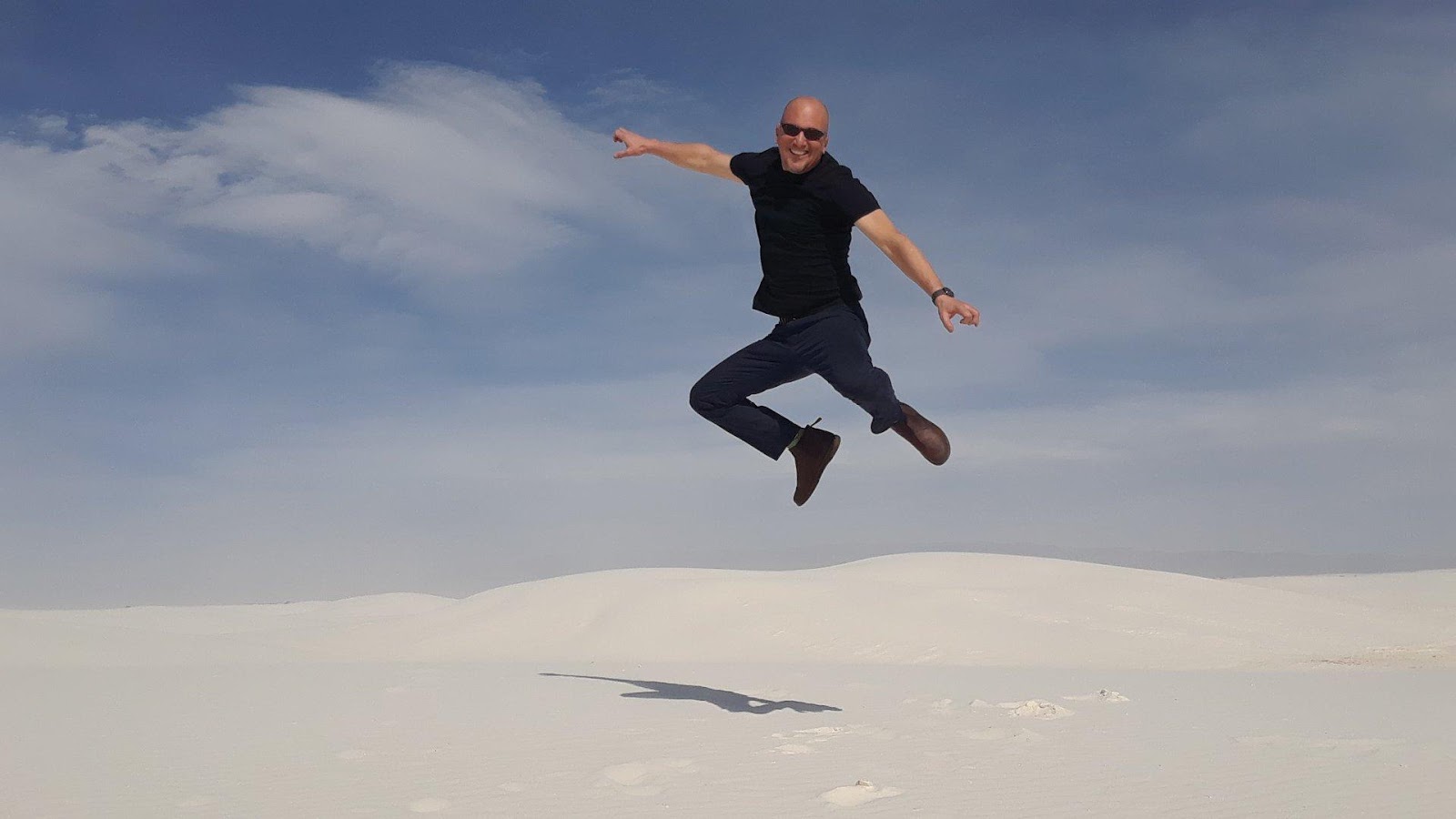
When did your interest in civil engineering begin?
I’ve always known that’s what I wanted to do. I had an uncle who was a civil engineer; he was one of my role models and I always admired him. Civil engineering struck me as a perfect combination of hands-on construction-related work and intellectual problem-solving.
What was your path to graduate school like?
It wasn’t direct, but I had some great jobs and good luck along the way. I earned my undergraduate degree at the University of Puerto Rico-Mayaguez, and shortly after that I entered the University of Florida, where I earned a master’s degree in geotechnical engineering. I then took a job as a load test specialist at a local Gainesville, Florida, firm that provided services nationally. With this firm, I had the chance to travel across 38 continental states and the Caribbean, giving me the opportunity of experiencing an array of diverse geologies and local construction nuances, which are essential to the development of a civil/geotechnical engineer.
When my then girlfriend and now wife got a graphic design job in the Atlanta area, we relocated and I began working at a company there. This was at a time when many companies were offering tuition reimbursement, so I decided to get an MBA, thinking it would be useful if I remained in industry, which was my intention. I had taught a little in Georgia, however, and really enjoyed it, so that planted a seed in my mind.
I wasn’t ready to dive back into academia just yet, however, and when my wife, who had by then become a fashion designer, was recruited by a fashion design firm, we moved to New York, and I found work there at a very highly regarded engineering firm. Then, the country plunged into a recession and like many Americans at the time I was laid off. At that point I remembered how much I had enjoyed teaching, and although I knew that good tenure-track jobs were not easy to get, I decided to earn my doctoral degree and see where it took me.
Why did you choose NYU Tandon for your graduate studies?
Again, luck played a role because this was a school with a great reputation not only close to my home but willing to accept me and give me the grants and scholarships I needed to be able to conduct my studies while helping to support a family. Then, once I met Professor Magued Iskander everything fell into place. He is a mentor in every sense of the word. In fact, I consider him a lifelong mentor. He still emails his students to let them know about consulting jobs we might be interested in or articles and lectures we might benefit from reading or attending. In fact, even though I graduated several years ago, we still do research and publish papers together, and we occasionally meet on a social basis.
What are you currently working at?
During my final year of doctoral work, I took a position as an adjunct instructor at Manhattan College. During that time, I was being heavily recruited by the New Jersey Institute of Technology for a full-time lecturer’s post, and I had my family to think of, so I accepted that. It’s a wonderful place, and I still lecture there, but in 2016 I found out about a tenure-track professorship at the New York City College of Technology (City Tech), right across the street from Tandon. In a way, I credit Professor Iskander because I discovered the opening through the ASCE-Met Section Geotechnical Engineering Group while serving on the board of directors, which I had originally joined at his behest.
I love teaching at City Tech. Many of my students are from groups underrepresented in the STEM fields, and I’m happy I can be a role model and mentor for them, while allowing them an opportunity for significant socioeconomic mobility. And, of course, it’s great to be able to run across the street and see my own role model and mentor, and occasionally teach a course.
Do you have any advice for those considering graduate school after having been away from the classroom for years?
I won’t sugar coat the PhD experience for you. It is an arduous lengthy process full of unknowns from the moment that you apply to the moment you land a tenure -track position and beyond. However, the scholastic tools that you develop, combined with goal-oriented self-discipline and persistence, and the wealth of interdisciplinary scientific knowledge that you acquire, allow for a freedom to pursue, at an elite level, your unique intellectual curiosities. A prize well worth the sacrifice. If you’ve been working in industry, you might have research in mind that you want to do or specific areas that you want to focus on. Keep an open mind though. See what’s on offer and mold your skills to the project at hand. You’ll gain more freedom as a researcher as time goes on.
Bertha Jimenez (‘16)
Technology Management and Innovation
Why did you decide to earn a doctoral degree at NYU Tandon?
I earned my undergraduate degree in my native Ecuador and then wanted to come to the U.S. to study. It was my first time living on my own, so I chose to earn my master’s degree at Portland State University, in Oregon, thinking that would be a comfortable, safe city to be in. By the time I was ready for my doctoral studies I also felt ready to tackle New York. Tandon had a great Technology Management program, which interested me, because I wanted to study the role higher education can play in the entrepreneurial ecosystem. Incidentally, I have extended family members on the East Coast, so it was a bonus being able to see them.
You, yourself, founded a successful company while still a student; how did that come about?
I participated in a challenge called the Global Idea Exchange (GIE), which called upon students from across NYU to collaborate on problems of social importance. That was the start of RISE (Real-time Industrial Symbiosis Exchange), which my team envisioned as an online marketplace for industrial by-products. More specifically, we knew that after breweries processed grain to make beer, they were left with a semisolid substance that might have potential uses in commercial bakeries. We subsequently arranged with a group of microbreweries in Brooklyn to make regular pick-ups of their spent grain, which would otherwise end up in landfills, and we set up a makeshift production facility to process it in my apartment.
Spent grain is 90 percent water, so the first step is to squeeze out as much as possible by machine. Then it has to be heated to kill any bacteria and make it fit for human consumption. After it’s dehydrated further, it can be milled and sifted, and the end product has more protein than chicken.
Do you think having the resources of the school behind you was a help?
It was a big help. We won an NYU “Green Grant” of $10,000 to refine the technology, and we were later named one of the top ideas in an OpenIDEO challenge to reduce food waste that Professor Anne-Laure Fayard encouraged us to enter. That recognition helped us attract private funding that we used to continue our research into optimal dehydration methods, do marketing, and undertake the other steps to becoming a full-fledged business.
What are some of the latest developments at Rise Products?
Before the pandemic, we were selling our flour to several professional chefs and hospitality groups, but as you can imagine, many of those have closed. One saving grace has been that even before we incorporated as a business, my fellow Tandon grad and business partner, Ashwin Gopi, and I had forged a strong relationship with Anheuser-Busch, the world’s largest brewer. We were invited to participate in their accelerator program, and after that we actually signed on to partner with them as a service provider. That’s very exciting, and even more exciting is that we had been exploring getting our baking mixes on store shelves, and that effort finally paid off. You’ll be able to find us at major retailers very soon!
Rich Perez (‘14)
Electrical Engineering
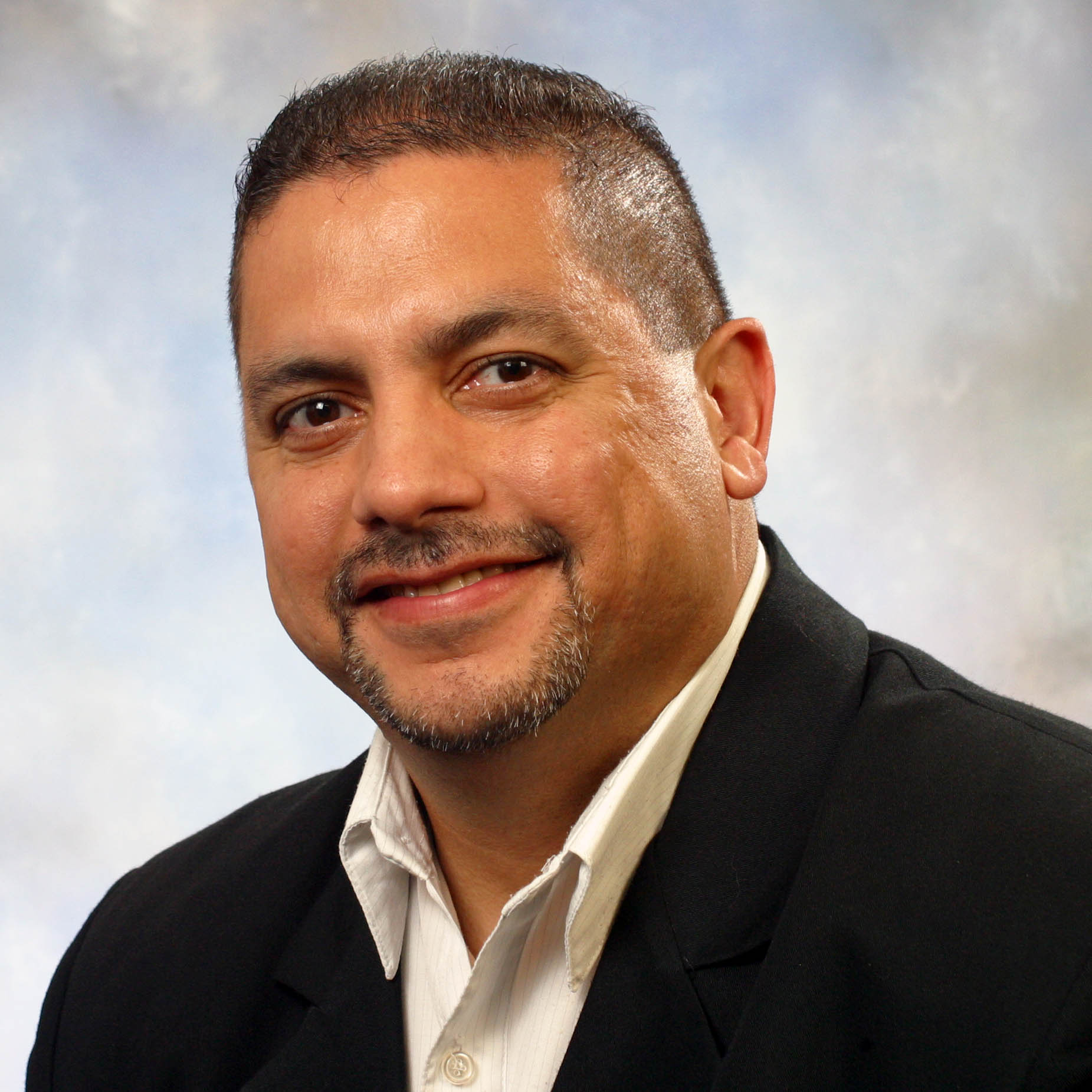 When did you first consider a career in electrical engineering?
When did you first consider a career in electrical engineering?
I knew from the time I was 11 that I wanted to be an electrical engineer. I grew up in Queens, I loved ham radio and was mentored by an amateur radio operator, so that was sort of the gateway for me. I was one of those kids who would tell anyone who would listen all about Ohm’s law. My first job in the industry was testing and troubleshooting high voltage power supplies and assemblies, and I worked in the field all throughout college and graduate school.
Why did you choose NYU Tandon?
Back when I earned my master’s in 2003, I was living on Long Island, and the school had a campus in Melville, so it was very practical, especially with working full time. Then, once you've been at Tandon and worked with Professors like Mike Knox and Nirod Das, you never want to study anywhere else. Das’s expertise and rigor was invaluable in helping me in my graduate studies, and Knox is a hands-on industry guy, so I related to him immediately.
Did you feel you needed a doctoral degree in order to advance in your career?
I was working by then in a very good job at Northrop Grumman, so really, I wanted my doctoral degree for personal enrichment.
Northrop Grumman is a great place where you can get a lot of multifaceted experience. Even if you’ve been assigned to one department or task, if something else interests you, you can ask to explore it. For example, I’m mainly engaged right now in modeling to assess how antennas and antenna arrays perform on an aircraft, which is very important in military applications. But if other things catch my interest I’ll pursue them. That said, it never hurts to have a doctorate, and it will probably have a positive effect on my career in the end.
Do you have any advice for those considering graduate school?
I hope this isn’t a cliche, but you need to find something that puts a fire in your belly. Even if you don’t start out when you’re 11 years old, you’re going to be studying it and working with it for a very long time, so make sure you really like what you do.
Juan Rodriguez (‘21)
Computer Science and Engineering
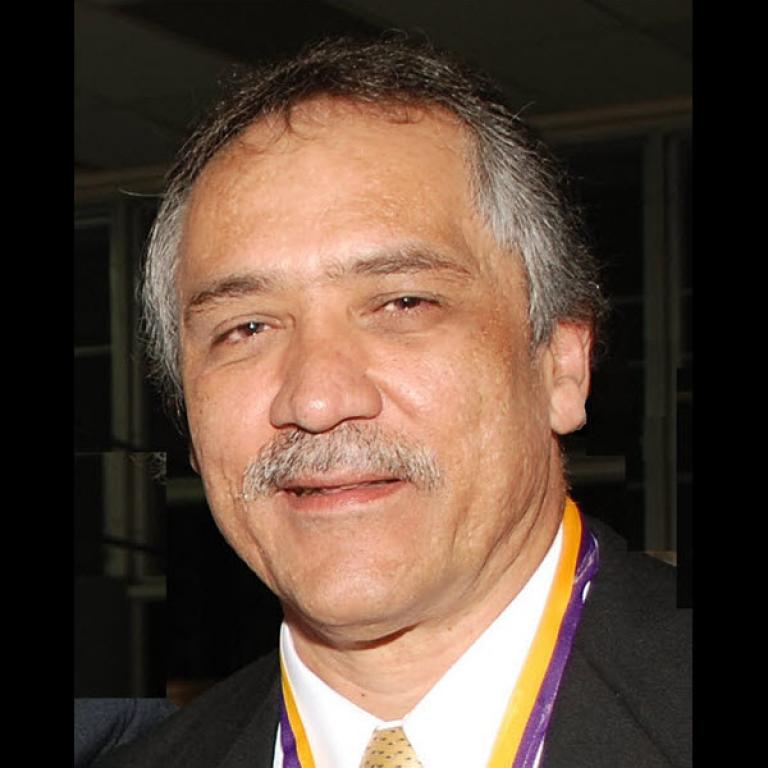 Why did you choose NYU Tandon for your graduate studies?
Why did you choose NYU Tandon for your graduate studies?
First, I earned my master’s degree here for very practical reasons. I was working full-time and Tandon provided the flexibility I needed. I stayed on to do doctoral work because I was lucky enough to meet Professor Torsten Suel and something just clicked. I felt a hunger to learn more. I approached him with what I saw as a win-win situation. I was still working full-time, so I didn’t need funding. I had reached a point in my career where my department ran smoothly, so I had the bandwidth to focus on research and study. So he agreed to serve as my Ph.D. advisor, and I believe that relationship has changed my life.
It doesn’t sound as though you had a conventional path to grad school. Could you describe your background a little?
You have to remember that I completed my undergraduate degree back in 1983. I was interested in computers but there really was no dedicated course of study; I had to major in electrical engineering. I then spent a few years exploring my options. I worked for the Federal Communications Commission in Washington, a radio network, and a maker of scientific instruments, and I ultimately became a systems architect at Memorial Sloan-Kettering Cancer Center. That was a job that made me feel good every day because it’s such a great institution with an important mission.
Still, I began to feel that something was missing. I had learned a lot as an electrical engineering major, certainly enough to do very well in my career, but I wanted to know the theory behind the computer science I was doing on a daily basis. That’s what prompted me to return to school in 2009 for a master’s.
Besides finishing up your doctoral studies, what else is going on.
In 2018 I left Sloan-Kettering after more than 25 years to join IBM. I’m now the manager of search engineering and information retrieval. Head hunters call me continually but I hadn’t been planning to switch jobs until I heard about this one; it encompassed every skill and area of interest I had, as though it had been created with me in mind.
The other thing that I’m doing is teaching big data analytics at Tandon. I’ve been doing that for almost six years, and there’s rarely a semester that goes by that students don’t come visit to tell me how much I’ve influenced them and to thank me. It’s amazing to me that they might think of me the way I think of Professor Suel.
Sometimes my two worlds meet, and I’m able to hire a student to be on my team at IBM. It’s very gratifying when that happens.
Do you have any advice for those considering graduate school after having been away from the classroom for years?
Learning is a lifelong process, and you’re never too old to satisfy your intellectual curiosity. I suggest going for it!
Santiago Torres Arias (‘20)
Computer Science
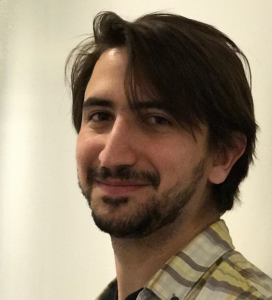 Why did you decide to come to NYU Tandon for your graduate studies?
Why did you decide to come to NYU Tandon for your graduate studies?
During my undergraduate years at Universidad Iberoamericana in Mexico City, I came across the book Computer Networking: A Top-Down Approach by Keith Ross, who was teaching at Tandon. I knew I needed to study with people like him, and I worked three jobs in order to save the money to come to New York.
What were your early semesters like?
I’m not going to sugarcoat it: It was hard, and I was constantly worried about running out of money. But everyone was so supportive, helping me find scholarships and opening doors to me. I mean that very literally: I initially majored in electrical engineering, but I was very interested in cybersecurity, and I had heard a lot about the OSIRIS (Offensive Security, Incident Response, and Internet Security) Lab. I wrote Professor Nasir Memon, who oversaw the lab, and he replied immediately, telling me that the way to get involved was to go over and just knock on the door. With that kind of welcome and encouragement I knew I’d never back down, no matter how hard it might have been financially.
Did things eventually get easier?
Yes, they did, especially after I met Professor Justin Cappos, who offered me a post as a research assistant. I worked with him on The Update Framework, which helps developers maintain the security of software update systems, like those used in the automotive industry.
He was a real inspiration for me, and I model my own style of teaching on his; my students also do a lot of hands-on work with real software.
Where are you teaching?
I’m now an assistant professor in the Electrical and Computer Engineering Department at Purdue University. In addition to teaching, I do research on Secure Systems, Applied Cryptography, and Software Supply Chain security.



